Indroduction
Shopify is one of the most popular e-commerce platforms in the world, offering a wide range of features to help businesses create, manage, and grow their online stores. Whether you’re an entrepreneur starting a new online venture or a large business looking for scalability, Shopify provides tools for every stage of growth.
In this review, we’ll explore Shopify’s key features, pricing, pros and cons, and overall suitability for businesses. This guide will help you determine if Shopify is the right solution for your needs.
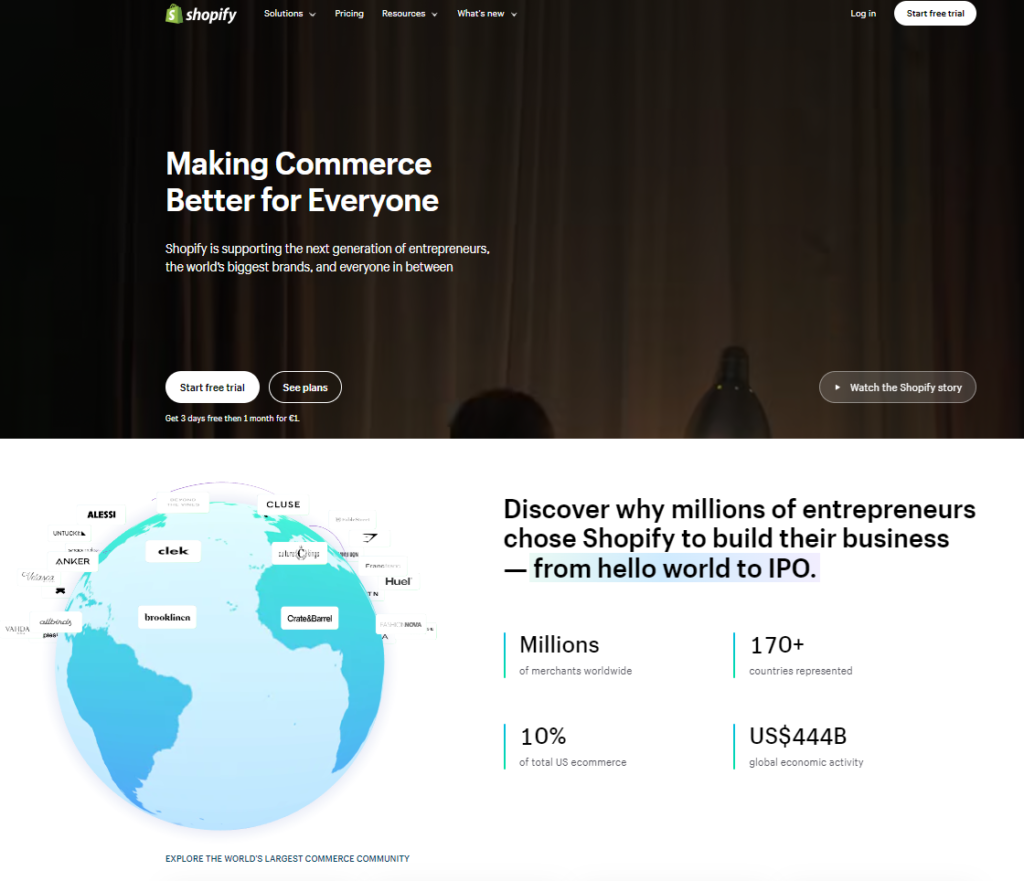
Ease of Use: Simple Setup, No Coding Required
One of Shopify’s standout features is its ease of use, particularly for individuals with little to no technical expertise. The platform offers a step-by-step setup process, guiding you through essential tasks like adding products, setting up payment methods, and configuring shipping options. The intuitive dashboard allows you to manage every aspect of your store, from product listings to customer orders, all in one place.
With its drag-and-drop editor, Shopify makes designing your store easy and accessible, without needing to write a single line of code. Whether you’re a beginner or an experienced e-commerce professional, Shopify simplifies the process of launching and managing an online store.
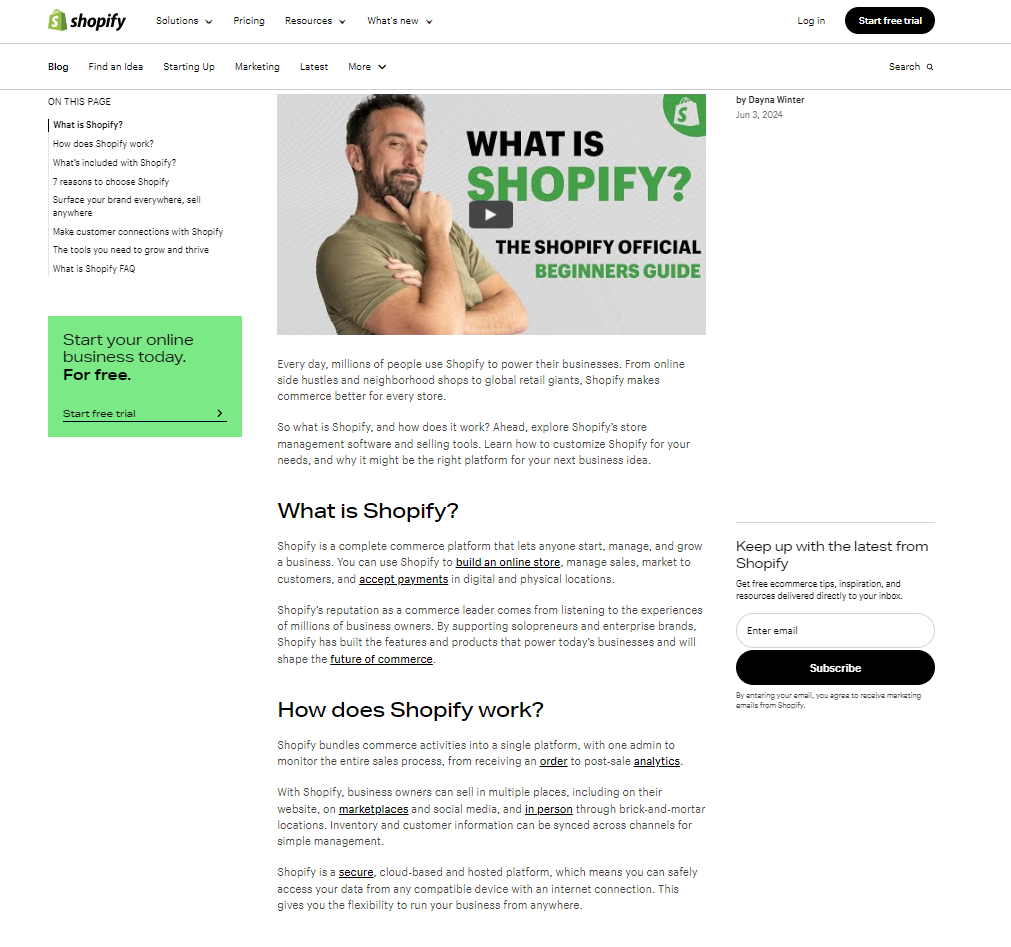
Design & Customization: Extensive Theme Library
Shopify offers over 100 mobile-responsive themes to help you design your store quickly and professionally. Whether you choose a free or premium theme, Shopify’s design options are sleek, modern, and fully customizable. The themes are designed to work seamlessly across different devices, ensuring a consistent shopping experience for customers, whether they’re browsing on a desktop or mobile phone.
For users who want deeper customization, Shopify allows access to the store’s HTML, CSS, and Liquid (Shopify’s templating language). This makes it possible to fine-tune every aspect of your store’s look and functionality.
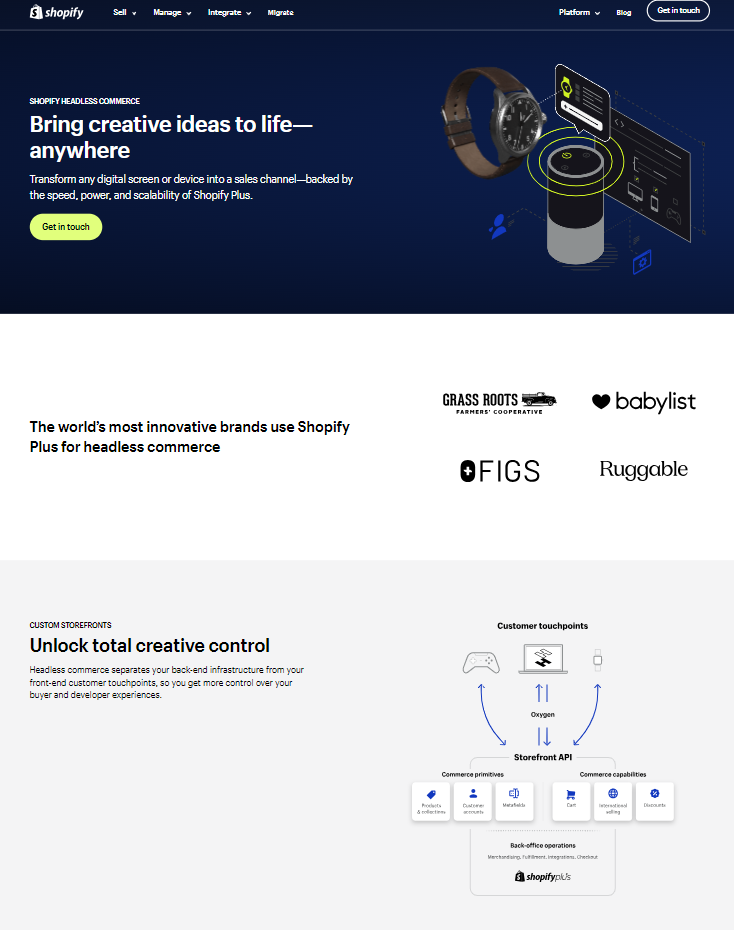
Payment Processing & Transaction Fees: Flexibility and Global Reach
Shopify supports over 100 payment gateways, making it incredibly flexible for businesses worldwide. Its built-in Shopify Payments allows you to accept payments without needing to rely on third-party services, saving you from additional transaction fees (which range from 0.5% to 2% if you use an external gateway). Shopify Payments is available in many regions, streamlining the process by eliminating the need for setup with external providers.
The platform also supports major third-party options like PayPal, Stripe, and Authorize.net, providing further flexibility. Shopify offers competitive transaction fees, which decrease as you move to higher-tier plans, helping you save as your business grows.
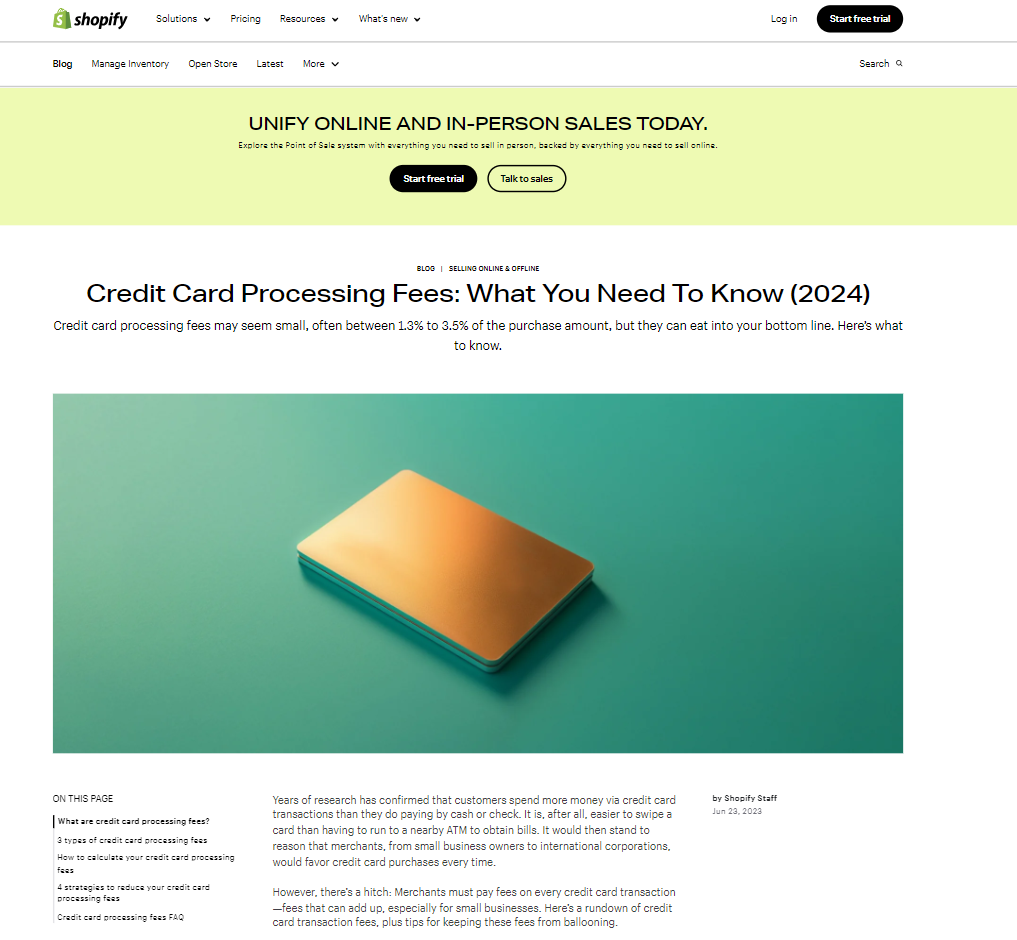
E-commerce Features: Packed with Tools for Growth
Shopify shines when it comes to e-commerce functionality. Some of the most notable e-commerce tools include:
- Inventory management: Easily track stock levels, set up alerts for low inventory, and manage variations like sizes and colors.
- SEO and marketing tools: Shopify provides built-in SEO features, such as customizable title tags, meta descriptions, and URLs. Marketing tools include automated email campaigns, discount codes, and integration with platforms like Google Ads and Facebook.
- Abandoned cart recovery: Automatically send reminders to customers who leave items in their carts without completing a purchase, increasing your conversion rates.
- Multichannel selling: Shopify integrates with social media platforms like Instagram, Facebook, and Pinterest, allowing you to sell across multiple channels directly from your store.
These features help businesses of all sizes manage daily operations efficiently while focusing on growth and customer retention.
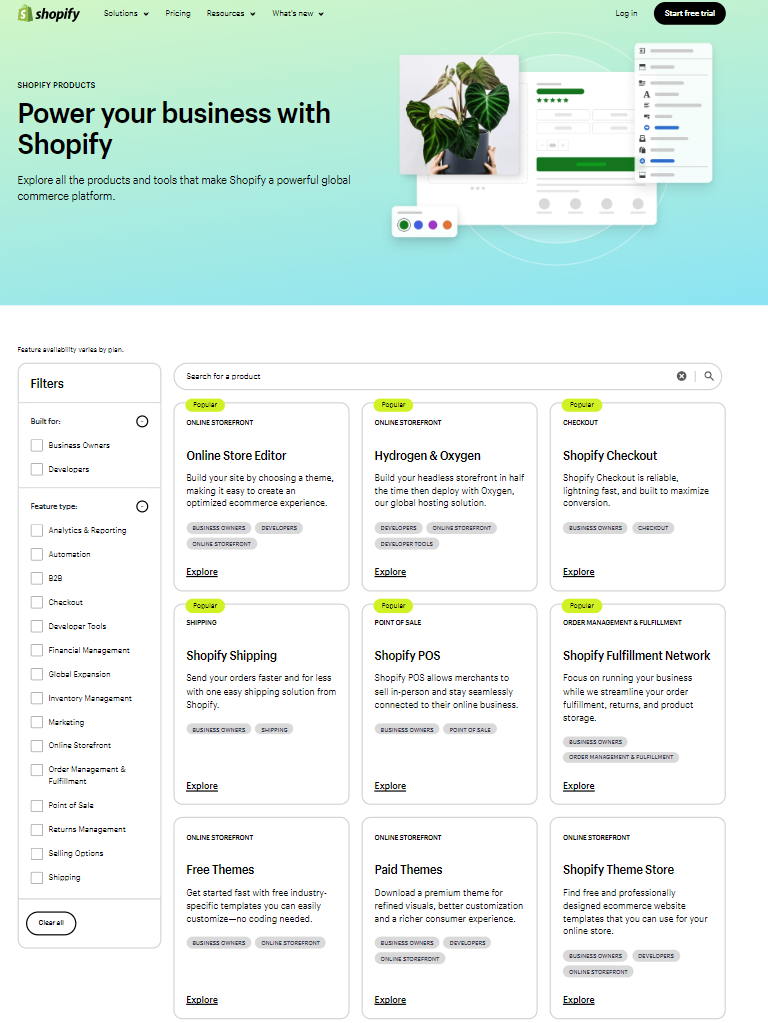
App Integrations: Extend Functionality with Shopify Apps
Shopify’s App Store is one of its biggest strengths, offering over 6,000 apps that extend the platform’s capabilities. Whether you need apps for dropshipping, marketing automation, shipping logistics, or customer reviews, the Shopify App Store has an option.
Some popular apps include:
- Oberlo for dropshipping.
- Mailchimp for email marketing.
- Yotpo for customer reviews.
These integrations are easy to install and often require no additional coding. With such a wide variety of apps, you can customize your store’s functionality to meet your specific business needs as you scale.
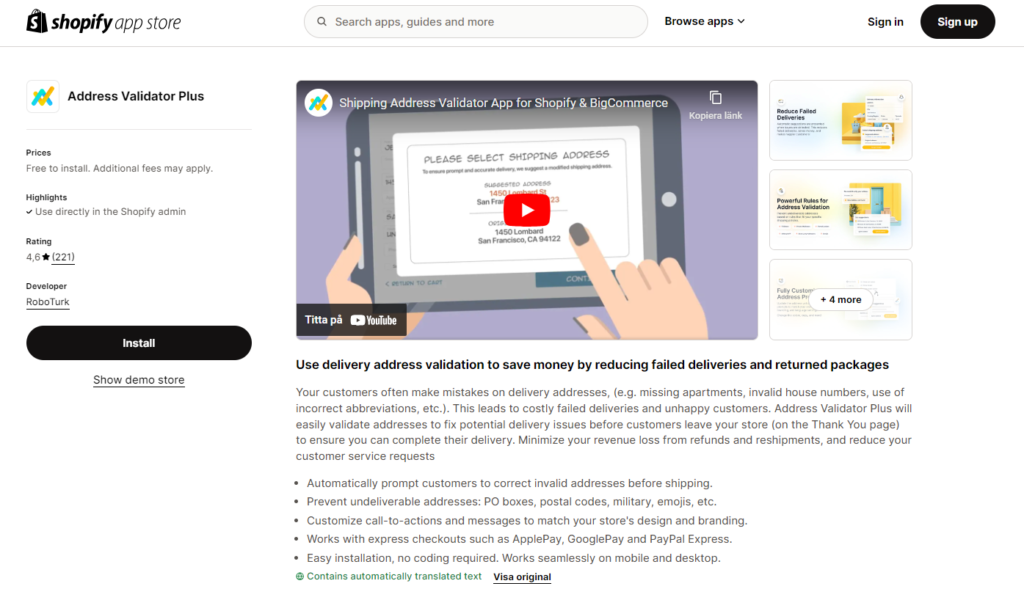
Shopify Pricing: Which Plan is Right for Your Business?
Shopify offers flexible pricing plans tailored to different business needs. Whether you’re a solo entrepreneur just starting out or a large corporation handling high sales volumes, Shopify provides several options. Here’s a breakdown of Shopify’s pricing structure, which includes both monthly and yearly billing options.
1. Basic Shopify Plan
Price: €32/month (or €24/month if billed yearly)
This plan is ideal for solo entrepreneurs or small businesses just getting started with e-commerce. The Basic Shopify Plan includes all the fundamental features you need to launch and manage an online store:
- 10 inventory locations: Manage stock across multiple locations.
- 24/7 chat support: Access customer support anytime.
- Localized global selling (3 markets): Expand your business to multiple regions.
- POS Lite: Basic Point of Sale features to help you sell in person.
Card rates start at 2% + €0.25 EUR for online transactions, with reduced fees for in-person sales (1.7% + €0.00 EUR).
This plan is perfect for small businesses needing essential e-commerce tools at a lower cost.
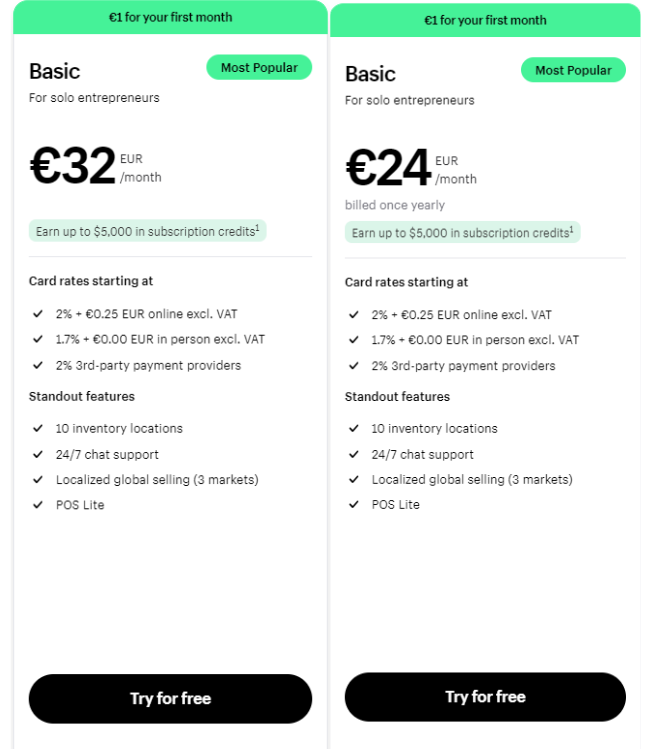
2. Shopify Plan
Price: €92/month (or €69/month if billed yearly)
Designed for small teams or growing businesses, the Shopify Plan adds more features to help you scale:
- 10 inventory locations: Manage inventory across different locations.
- Localized global selling (3 markets): Allows you to expand your store’s reach globally.
- 5 additional staff accounts: Collaborate with team members by giving them access to the store.
- POS Lite: Continue selling in person with basic Point of Sale features.
Card rates start at 1.7% + €0.25 EUR for online transactions, with a lower 1.6% + €0.00 EUR rate for in-person payments.
This plan offers more scalability with advanced reports, making it ideal for businesses beginning to grow.
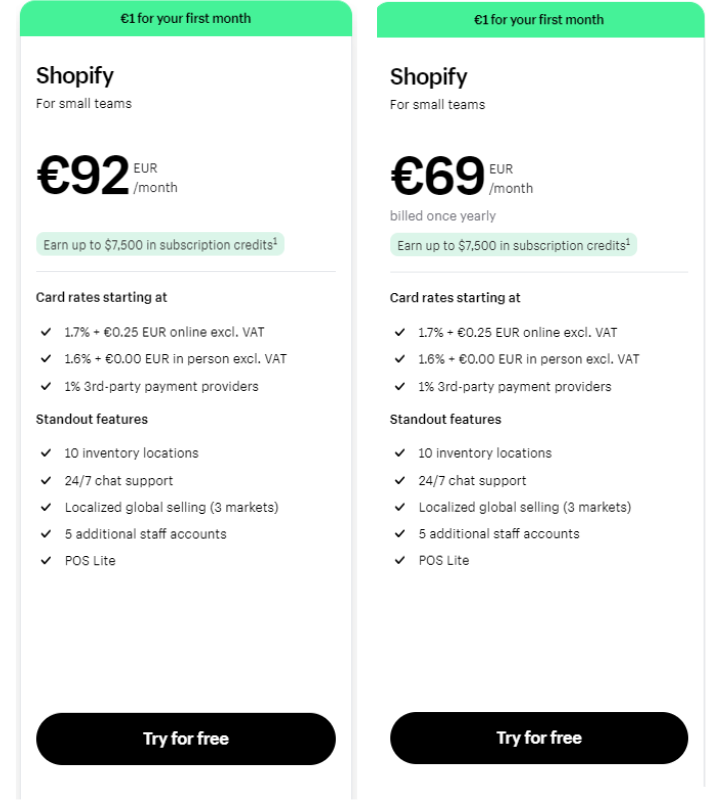
3. Advanced Shopify Plan
Price: €384/month (or €289/month if billed yearly)
The Advanced Shopify Plan is targeted at businesses that are scaling and need advanced tools for complex operations:
- 15 staff accounts: Provide access to more team members as your business grows.
- Advanced reporting and analytics: Get in-depth data insights to inform business decisions.
- Advanced shipping options: Localized global selling (3 markets) and additional markets for €89 USD/month.
- 10 inventory locations: Continue managing your growing inventory across multiple locations.
The transaction fees are reduced even further, starting at 1.5% + €0.25 EUR for online payments and 1.5% for in-person sales.
This plan is perfect for businesses that need comprehensive reporting tools and advanced shipping features.
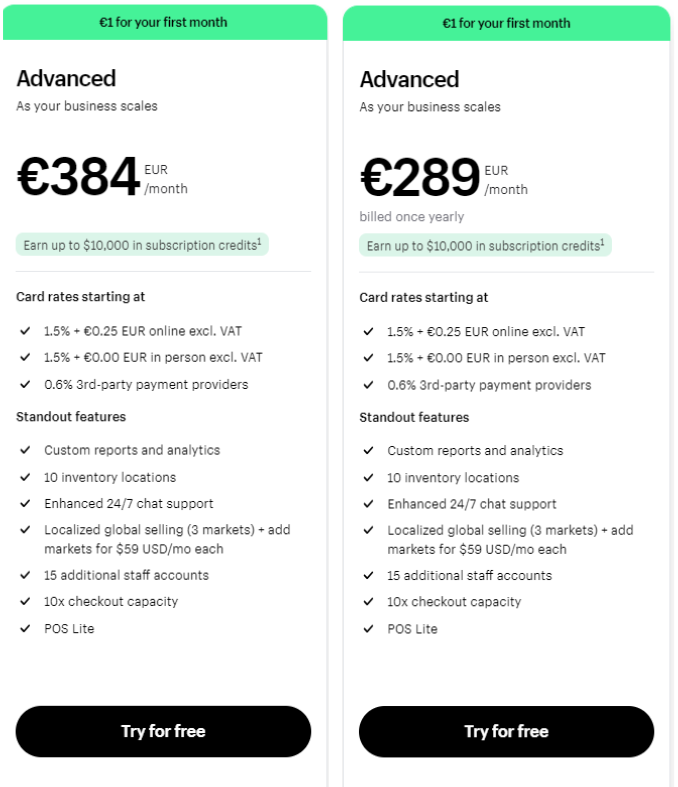
4. Shopify Plus Plan
Starting at $2,300 USD/month
For large enterprises or high-volume merchants, Shopify Plus offers custom pricing and features built to handle complex business needs. Shopify Plus includes:
- Custom reports and analytics: Advanced data insights tailored to your business.
- 200 inventory locations: Handle extensive product inventories.
- Priority 24/7 phone support: Dedicated support for high-priority issues.
- Unlimited staff accounts: No limits on team members managing your store.
- Fully customizable checkout: Allows 40x more customization in your checkout process.
- 200 Point of Sale (POS) locations: Ideal for businesses with a large physical retail presence.
Shopify Plus is a fully scalable solution designed for global, high-growth brands.
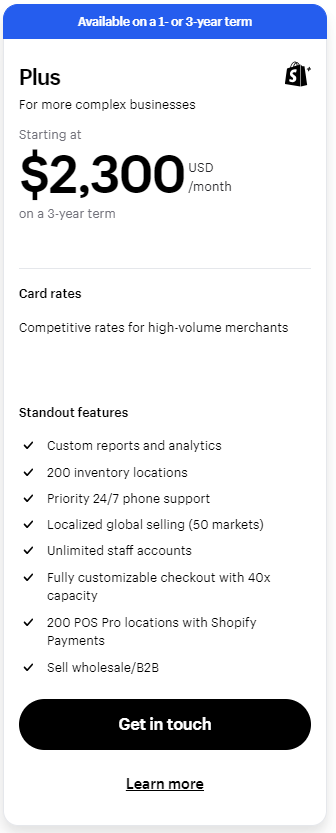
Pros and Cons of Shopify
Like any e-commerce platform, Shopify has its advantages and drawbacks. Understanding these will help you make an informed decision about whether Shopify is the right fit for your business.
Pros of Shopify
Ease of Use
- Shopify’s user-friendly interface makes it simple to set up and run an online store without needing technical expertise. With drag-and-drop functionality and straightforward navigation, you can easily manage products, orders, and inventory.
Comprehensive E-commerce Features
- Shopify offers a robust set of tools for businesses, including SEO optimization, abandoned cart recovery, and multi-channel selling. These features allow you to streamline operations and enhance your store’s performance.
Extensive Theme and App Marketplace
- Shopify provides access to a vast library of both free and premium themes that are customizable and mobile-friendly. Additionally, the Shopify App Store offers thousands of apps that extend your store’s capabilities, including marketing tools, integrations, and logistics support.
Scalability
- Whether you’re just starting out or running a high-volume business, Shopify can scale with your needs. Its pricing tiers and advanced features, like real-time analytics and third-party shipping integrations, allow businesses to grow without switching platforms.
Reliable Customer Support
- Shopify offers 24/7 customer support through live chat, phone, and email. Along with the Shopify Help Center, Academy, and Community Forums, users have multiple resources for troubleshooting and learning.
Cons of Shopify
Transaction Fees
- If you don’t use Shopify Payments (the built-in payment processor), Shopify charges additional transaction fees on top of credit card processing fees, ranging from 0.5% to 2% depending on your plan. This can add up for businesses that rely on third-party payment gateways.
Cost of Add-Ons
- While Shopify’s core features are comprehensive, some advanced tools and functionalities (such as certain apps and premium themes) come with additional costs. As your store grows, these add-ons can increase your monthly expenses.
Customization Limitations
- While Shopify offers customization options through HTML, CSS, and Liquid, businesses with highly specific design or functionality requirements may find some limitations compared to open-source platforms. Advanced customization often requires the help of a developer.
Limited Blogging Features
- Although Shopify includes a blogging tool, it is somewhat basic compared to dedicated content management systems like WordPress. For businesses that rely heavily on content marketing, Shopify’s blogging features may feel restrictive.
Customer Support & Resources: 24/7 Assistance and Learning Opportunities
Shopify offers 24/7 customer support through live chat, email, and phone, making it easy to get help whenever you need it. Whether you’re facing a technical issue or need advice on best practices, Shopify’s customer service team is readily available.
In addition to direct support, Shopify provides a wealth of resources to help you succeed:
- Shopify Help Center: A library of articles covering every aspect of setting up and running a Shopify store.
- Shopify Academy: Free courses on topics like product sourcing, store setup, and marketing strategies.
- Community Forums: Engage with other Shopify users, ask questions, and share insights.
These resources are especially useful for new users who are learning the platform, as well as experienced merchants looking to optimize their store’s performance.
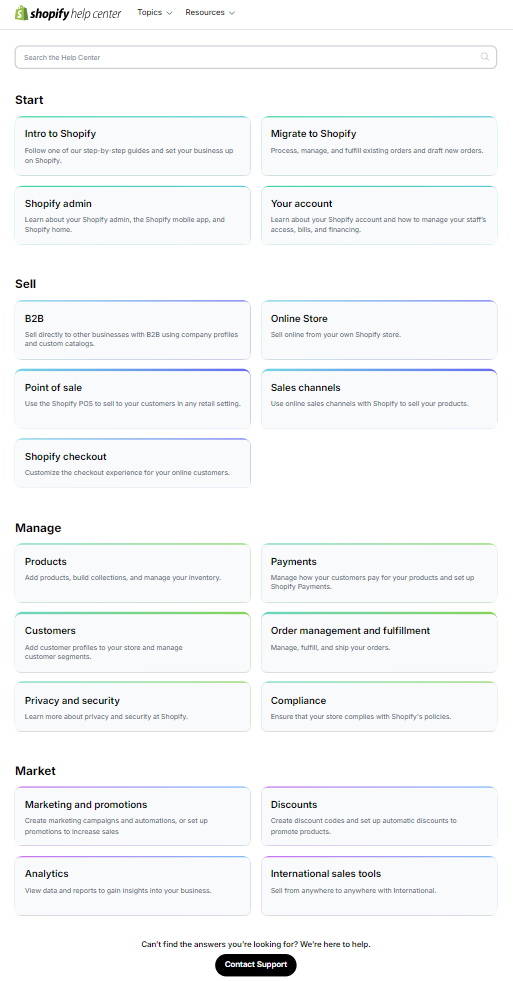
Conclusion: Is Shopify the Right Choice for Your Business?
In conclusion, Shopify is a powerful and versatile e-commerce platform suitable for businesses of all sizes. Its ease of use, extensive customization options, and wide range of e-commerce features make it a popular choice for entrepreneurs and established companies alike. Although Shopify’s pricing is higher than some competitors, the value it provides in terms of tools, support, and scalability makes it a solid investment for anyone serious about growing their online store.
If you’re considering Shopify, the platform’s combination of usability, flexibility, and growth potential positions it as one of the best options available in the e-commerce space.
Final image suggestion: A closing graphic summarizing Shopify’s key features or a branded image with Shopify’s logo could leave a strong visual impression.
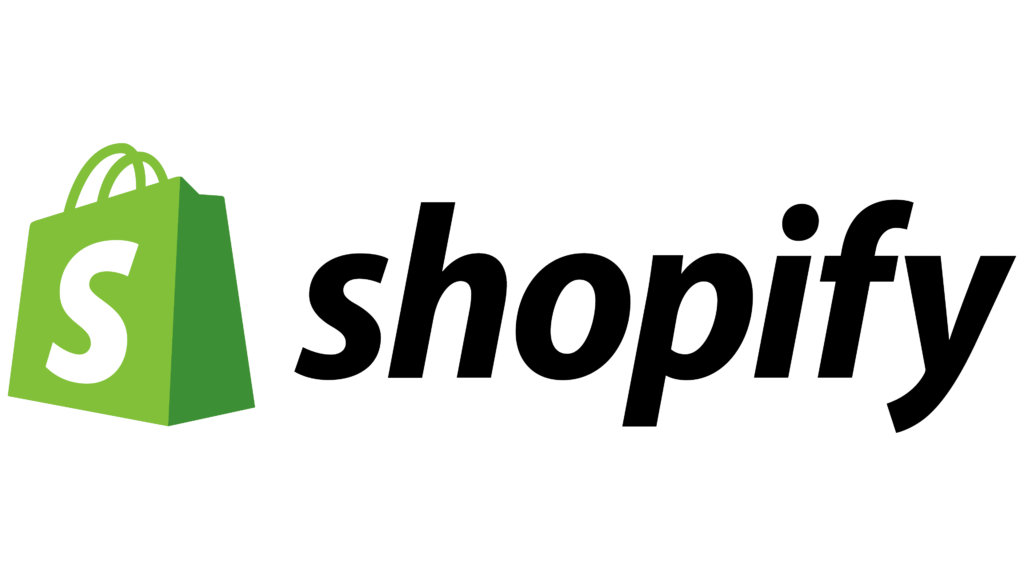
If you want to read more blogs, click here

